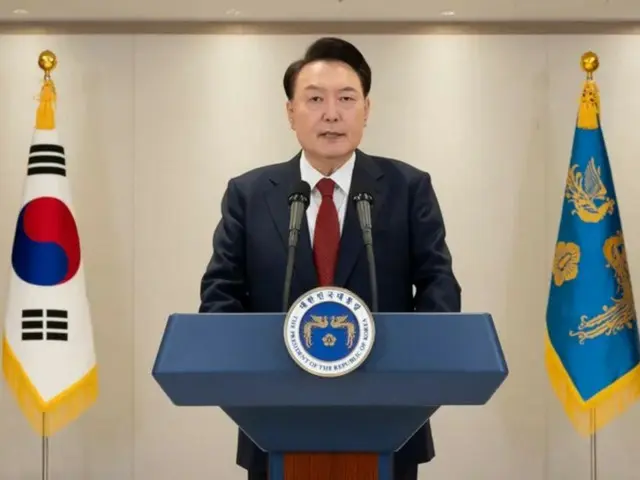The day before, lawyer Seok Dong-hyun, who is involved in forming Yoon's legal team, told reporters, "I think it will be difficult for him to appear in court."
This is the second time Yoon has refused the request, following the request on the 18th. The opposition party has criticized him for "refusing to investigate and delaying the investigation." Yonhap News Agency said, "The High-Ranking Public Officials Crime Investigation Agency (PPA) has
"We plan to decide as early as the 26th whether to request a second summons or an arrest warrant," the report said. Amid the successive arrests of former defense ministers and military commanders who are believed to have been involved in the state of emergency,
Attention is focused on whether the investigation will extend to Yoon as well. Yoon declared "emergency martial law" late at night on the 3rd. This is a type of martial law stipulated in the South Korean Constitution, and is a military emergency necessary in times of war or other emergencies.
Martial law is issued by the president in the event of a civil war or to maintain public order. The military takes control of administrative and judicial functions and is authorized to restrict freedom of speech, press, and association.
Following the issuance of the order, armed martial law soldiers broke the windows and stormed into the National Assembly building. In a scene reminiscent of the military regime, many citizens gathered in front of the National Assembly.
They shouted slogans against martial law and surrounded military vehicles, causing chaos. However, martial law is lifted only if a majority of members of the National Assembly request it, and the president must comply with this request.
Immediately after the declaration, a plenary session of the National Assembly was held, and all 190 members in attendance voted in favor of lifting the state of emergency. Yoon lifted the state of emergency after just six hours.
Opposition parties, including the Democratic Party of Korea, have accused Yoon of "attempting to suspend the constitutional order and to violate permanent rights."
The bill to impeach Yoon was submitted to the National Assembly, citing "attempted insurrection to seize power" and other violations of the Constitution. The bill was passed by 204 votes in favor and 85 against on the 14th.
As a result, Yoon's presidential powers were suspended, and Prime Minister Han Deok-soo became acting president. Yoon issued a statement immediately after the impeachment bill was passed, saying, "I will pause for a while.
However, the journey to the future that we have walked together with the people for the past two and a half years must not come to a halt," he said, hinting at his eagerness to return to his duties, saying, "I will never give up."
Meanwhile, the opposition party not only submitted an impeachment motion against Yoon to the National Assembly, but also accused him of treason.
The Public Prosecutor's Office, the national investigative agency, is currently investigating the case. Article 87 of the Korean Criminal Code stipulates that riots with the intent of eliminating state power or violating the national constitution are punishable as treason. The maximum penalty is death.
Article 84 of the Korean Constitution stipulates that "The President shall not be subject to criminal prosecution while in office, except in cases of internal rebellion or foreign treason." Although the incumbent president enjoys immunity from arrest,
Since the crime of rioting is an exception, it is possible for Yoon to be arrested and prosecuted. In the past, former presidents Chun Doo-hwan and Roh Tae-woo both faced charges of rioting when the military launched a democratization movement in 1980.
There have been cases where people have been sentenced to prison for treason in relation to the "Gwangju Uprising," which was a coup that was carried out by the Democratic Party of Korea, and have been imprisoned after leaving office. However, Yoon has maintained in a speech to the nation that he "had no intention of starting a rebellion."
The investigation headquarters issued the first request for Yoon to appear on the 18th, but Yoon did not respond. The investigation headquarters requested him to appear again at 10 a.m. on the 25th, but Attorney Seok, who is involved in selecting Yoon's defense team, responded on the 24th.
On the 2nd, he spoke on his behalf, saying, "Since the National Assembly has filed an impeachment suit, President Yoon believes that the impeachment trial procedure at the Constitutional Court should take priority," making it clear that it would be difficult for him to appear in court.
Yoon did not show up at 10 a.m. on the 25th, as specified by the investigation headquarters, and although the investigation headquarters waited throughout the day, Yoon did not respond.
Criticism of Yoon is growing, and the opposition party has called for his immediate arrest, citing concerns that evidence may be destroyed.
- National Police Agency Commissioner Ji-ho and Seoul National Police Agency Commissioner Kim Bon-sik have been arrested. Yoon has refused to appear twice, so is there a possibility that they will forcibly take him into custody, such as by requesting an arrest warrant?
According to Yonhap News, a Public Prosecutor's Office official stated, "The next steps have not yet been decided," showing a cautious stance.
2024/12/26 14:10 KST
Copyrights(C)wowkorea.jp 5

